| Author |
 Topic Search Topic Search  Topic Options Topic Options
|
Luckedout 
Guest


Joined: October 11 2009
Location: Layton
Status: Offline
Points: 1495
|
 Post Options Post Options
 Thanks(0) Thanks(0)
 Quote Quote  Reply Reply
 Topic: 20k vs 14k bulbs Topic: 20k vs 14k bulbs
Posted: October 01 2010 at 12:45pm |
|
I'm thinking about switching out my 14k bulbs to go 20k bulbs over my tank. This is more for aesthetics than anything. Any advantages/disadvantages of doing so? Will growth suffer? Thanks
|
|
-Ben
90g Mixed reef
www.body-balancechiropractic.com
|
 |
jcom 
Guest

Joined: November 23 2009
Location: SLC
Status: Offline
Points: 579
|
 Post Options Post Options
 Thanks(0) Thanks(0)
 Quote Quote  Reply Reply
 Posted: October 01 2010 at 1:04pm Posted: October 01 2010 at 1:04pm |
|
What wattage? What fixture/bulb type?
|
 |
Ahanix 
Guest

Joined: February 11 2010
Location: Eagle Mountain
Status: Offline
Points: 1670
|
 Post Options Post Options
 Thanks(0) Thanks(0)
 Quote Quote  Reply Reply
 Posted: October 01 2010 at 1:09pm Posted: October 01 2010 at 1:09pm |
|
I would go for it. Pretty much you are trading a little bit of growth for more coloration.
|
 |
Luckedout 
Guest


Joined: October 11 2009
Location: Layton
Status: Offline
Points: 1495
|
 Post Options Post Options
 Thanks(0) Thanks(0)
 Quote Quote  Reply Reply
 Posted: October 01 2010 at 1:10pm Posted: October 01 2010 at 1:10pm |
 jcom wrote: jcom wrote:
What wattage? What fixture/bulb type? |
Double Ended 150w
|
|
-Ben
90g Mixed reef
www.body-balancechiropractic.com
|
 |
SGH360 
Guest


Joined: April 04 2010
Location: Centerville, UT
Status: Offline
Points: 1786
|
 Post Options Post Options
 Thanks(0) Thanks(0)
 Quote Quote  Reply Reply
 Posted: October 01 2010 at 2:06pm Posted: October 01 2010 at 2:06pm |
here is a website comparing the colors, PAR, and brand. it maybe 250W but you can get the idea
|
 |
Luckedout 
Guest


Joined: October 11 2009
Location: Layton
Status: Offline
Points: 1495
|
 Post Options Post Options
 Thanks(0) Thanks(0)
 Quote Quote  Reply Reply
 Posted: October 01 2010 at 3:50pm Posted: October 01 2010 at 3:50pm |
|
that's a neat website, but it's a pretty low sample of bulbs. Where are the PAR values being measured? Bottom of the tank?
I'm also curious about growth of corals with different bulbs.
|
|
-Ben
90g Mixed reef
www.body-balancechiropractic.com
|
 |
SGH360 
Guest


Joined: April 04 2010
Location: Centerville, UT
Status: Offline
Points: 1786
|
 Post Options Post Options
 Thanks(0) Thanks(0)
 Quote Quote  Reply Reply
 Posted: October 01 2010 at 4:03pm Posted: October 01 2010 at 4:03pm |
|
thats the closest thing i could find that people compare MH bulbs. Others are just mix opinions
|
 |
Luckedout 
Guest


Joined: October 11 2009
Location: Layton
Status: Offline
Points: 1495
|
 Post Options Post Options
 Thanks(0) Thanks(0)
 Quote Quote  Reply Reply
 Posted: October 01 2010 at 4:25pm Posted: October 01 2010 at 4:25pm |
|
My other thought is to go with 10k bulbs and get more acitinic bulbs to counter the white. Then I get good growth, PAR and good color.... just wish MH bulbs were cheaper.
|
|
-Ben
90g Mixed reef
www.body-balancechiropractic.com
|
 |
ninja_brandon 
Guest


Joined: January 29 2009
Location: Salt Lake City
Status: Offline
Points: 260
|
 Post Options Post Options
 Thanks(0) Thanks(0)
 Quote Quote  Reply Reply
 Posted: October 01 2010 at 4:28pm Posted: October 01 2010 at 4:28pm |
If you are running power compacts and or T5 bulbs in conjunction with your Halides you may want to take that into consideration. My actinic bulbs were really blue/purple and when I ordered my 20k bulbs I instantly regretted it since my tank was a constant vibrant blue. I missed the bright daylight look of the 14k bulbs during the day. :(
I also noticed less growth from my 20k bulbs which was kind of demoralizing. I have since decided to purchase the phoenix 14k bulbs since I hear such good things about them and keep the 20k as a backup. I think its all in the combination of t5/pc and halides. Whenever I visit someone with a nice tank I always ask about the lighting.
|
 |
BobC63 
Admin Group

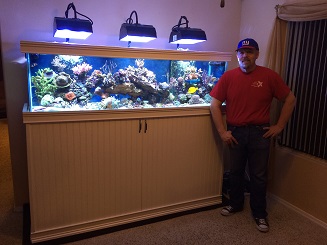
Joined: January 17 2007
Location: Lehi, UT
Status: Offline
Points: 8968
|
 Post Options Post Options
 Thanks(0) Thanks(0)
 Quote Quote  Reply Reply
 Posted: October 01 2010 at 9:25pm Posted: October 01 2010 at 9:25pm |
In general, the higher the Kelvin rating (the "k" after the number in a 10K or 20K bulb) the less PAR a bulb has. PAR ( Photosynthetically Active Radiation, I think) is basically the amount of light energy released that corals can actually utilize.
So a 10K will have greater PAR than a 15K, which in turn has greater PAR than a 20K. And lower PAR generally equates to slower coral growth.
There are some exceptions, but generally the lower K / higher PAR bulbs are better for growth, the higher K bulbs for colorization and "pop".
But PAR is only 1 factor in determining coral growth. Things like total photperiod, water temperature and temperature stability / range; levels of Alk /Ca / Mg and even Strontium and Boron - and again, stablity of those levels; water flow in the tank; availability of nutrients / food in the water column; even fishes and are they "picking on" the coral at all... All those things help determine coral growth; not just PAR levels.
Personally I think people give too much weight to PAR alone. The best reef tanks I have ever seen usually had decent lighting - but not necessarily the most intense / highest PAR lighting. But they almost always excelled in most or all of the other areas I mentioned...
Also, there are ways to help make up for PAR loss when going from a 10K to a 15 or 20K bulb:
- run your lights for a longer photperiod (maybe an extra hour or 2)
- lower your lights closer to the water
- raise your corals higher in the tank
- add supplemental lighting to boost the overall output
IMO, I would choose the Kelvin color of lighting that appeals to me visually first; not necessarily which K rating puts out the highest PAR.
Edited by BobC63 - October 01 2010 at 9:26pm
|
|
- My Current Tank: 65g Starfire (sitting empty for 2+ years) -
* Marine & Reef tanks since 1977 *
|
 |
bstuver 
Guest


Joined: April 17 2006
Location: Provo
Status: Offline
Points: 9381
|
 Post Options Post Options
 Thanks(0) Thanks(0)
 Quote Quote  Reply Reply
 Posted: October 01 2010 at 9:36pm Posted: October 01 2010 at 9:36pm |
|
I tried 20k way too blue for me, I ordered 14k phoenix bulbs and love them!!
|
|
Jackie Stuver
"wait these aren't the happy Hawaiians oompa doompa godly heaven on your face zoas? I dont want them then. lol!" Ksmart
|
 |
Mark Peterson 
Paid Member


Joined: June 19 2002
Location: Murray
Status: Offline
Points: 21436
|
 Post Options Post Options
 Thanks(0) Thanks(0)
 Quote Quote  Reply Reply
 Posted: October 02 2010 at 9:23am Posted: October 02 2010 at 9:23am |
 BobC63 wrote: BobC63 wrote:
Personally I think people give too much weight to PAR alone. |

I have grown coral just fine with a 20,000 Kelvin MH bulb. The coral farming tank was not my display. It was too blue for my eyes.
Keep in mind that a PAR meter
that was developed to measure the light needed by plants growing in the
world of air and dirt. The other world, "The Deep", where marine
Zooxanthellae Algae live, is different. Zooxanthellae algae grows good
just on the bluish light that reaches it through the water. Water absorbs
most of the red end of the spectrum so, except for the SPS in the surf zone, light from the blue end of the rainbow is the biggest portion of what coral need to grow. It has been found that the red side of the spectrum is needed by Zooxanthellae but at a much lower intensity. The complete rainbow of color is mostly for our enjoyment.
I agree with everyone that there can be benefit to using a combination of MH and fluorescent
lighting. Some light is for growth and some is for looks. There is not much shimmer past the surf zone. You might
almost say that the light we see is what the coral does not need. Here are some pics that Jacque Cousteau published for me to illustrate my point...  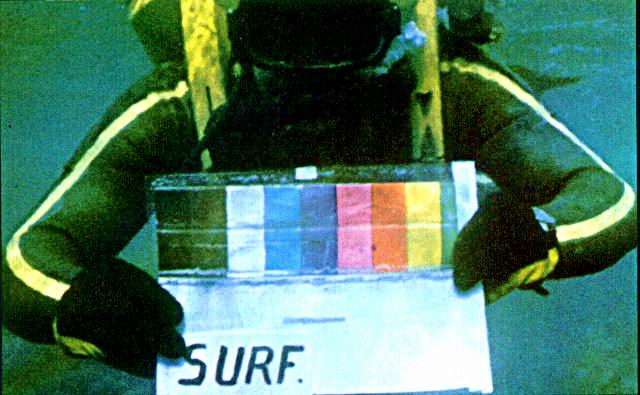 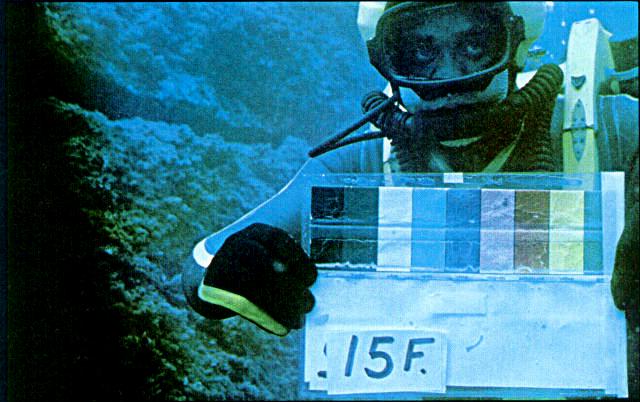 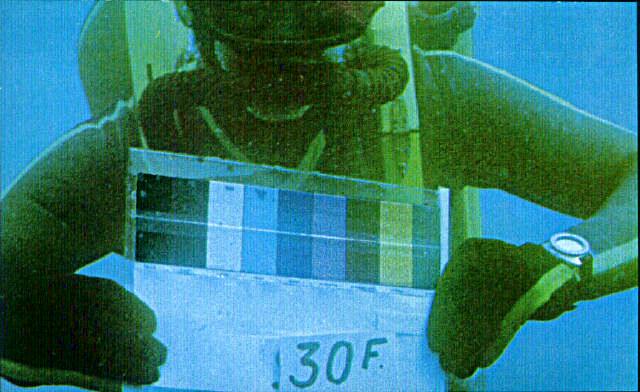 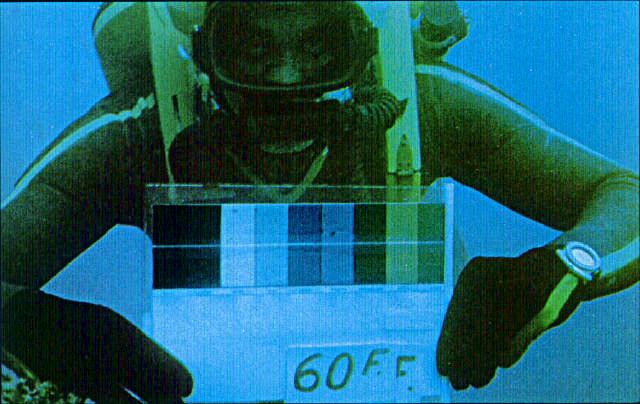 Look how quickly the yellow, orange and red disappears! In fact, the red was already pink in the surf level.  It's my understanding that most of the coral we keep comes from depths 10 to 100 feet down. MH lights are so intense, meaning they put out so much light, that even 10,000 Kelvin bulbs, which have a lot of yellow, orange and red, still grow coral really well. This is because they are also very intense with bluish light, the side of the rainbow needed by coral. The newly developed T5 multi-colored combinations are addressing the corals need for the correct parts of the rainbow. Hobbyists with all T5's are seeing good growth and intense color. Some of them add the comment that their tank does not look as bright as it did/would with common MH lights. Neither did my 12" deep coral farming tank with the single 400W 20K MH hanging 8 inches above the water. My 2 cents 
Edited by Mark Peterson - October 02 2010 at 9:38am
|
Reefkeeping Tips, & quick, easy setup tricks:www.utahreefs.com/forum/forum_posts.asp?TID=9244 Pay it forward - become a paid WMAS member 
|
 |